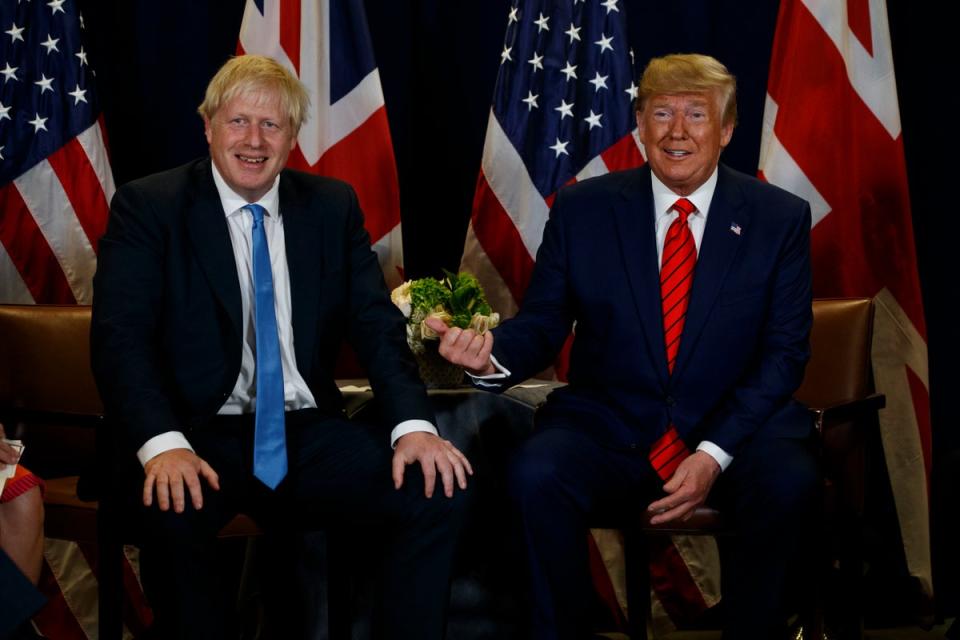Voices: I’m watching Boris Johnson’s downfall from Washington DC and I have some questions

Just over two years ago, your humble correspondent watched as members of the Republican Party in the House, then the Senate, put all their efforts into explaining away a Donald Trump-sized scandal. Then-President Trump’s stood accused of blackmailing Ukrainian President Volodymyr Zelensky into announcing sham investigations into Joe Biden and his son in exchange for Javelin anti-tank missiles and an invitation to the White House. As members of his own party sought to ignore or equivocate on the matter, it became obvious the accusation was true.
A year after that, it was basically the same old story. Only seven Republican Senators — one more than the previous go-round — voted to convict Trump at the second of his two impeachment trials after the Capitol insurrection on January 6th 2021. On that now-infamous day, Trump egged on a riotous mob of his supporters as they stormed the Capitol in a last-ditch effort to keep him in office after he lost to the man he’d tried to get Zelensky to sandbag. Again, Republicans did basically nothing. Some openly supported Trump; others suggested the riot was a setup by Antifa.
So on this side of the pond, you might forgive us Americans for believing that a brash, wildly coiffed, tow-headed populist conservative leader with a history of lying getting forced out of office by members of his own party would be the stuff of pure fiction. But apparently that’s not the case.
Congressional Republicans were twice unwilling to deal a killing blow to Trump, but over the last 24 hours, more than 55 card-carrying members of the UK’s Conservative party — elected Members of Parliament all — had no qualms about slipping their own knives into Alexander Boris de Pfeffel Johnson. Who knew such a thing was possible?
As an American who spends his days putting words on pages for a British newspaper, I make an effort to keep at least one eye on Westminster and Whitehall. I need to make sure that I’m keeping abreast of matters on which the White House or any of the 535 US representatives and Senators might desire to opine. Usually, Westminster’s dramas pale in comparison to those playing out here in Washington DC. But watching the goings-on in and around the House of Commons this week has been nothing short of amazing.
Whether it was seeing Johnson take incoming from all sides at Prime Minister’s Questions (a tradition the US political system is poorer for lacking), or the blistering resignation speech former Health Secretary Rishi Sunak delivered just after, or watching one committee chair after another pick him apart in Wednesday’s liaison committee session, seeing Tory MPs find the resolve to criticize their own leader and call for him to vacate Number 10 was an absolute revelation. Perhaps the reason British Conservatives were able to locate their backbones so much more easily than their American cousins is that the UK system hasn’t been rigged like the US one has.
Over here, Congressional and legislative districts are almost always the province of the same politicians who will be elected by the people in districts they draw. As myriad observers have noted, both Republicans and Democrats (but mostly Republicans) have used that power after each decennial census to draw districts so lopsided that the only way they can lose re-election is if they anger the most hard-line elements who turn out for primary elections. And deserting Donald Trump is certainly a surefire way to anger them.
Or perhaps it’s the lack of primaries entirely. Here, our two-round election system means the fringes who vote in those primaries get to select who voters can choose from when they show up for the general election. It wasn’t always thus, but over the last half-century, primaries have replaced the proverbial smoke-filled rooms where party bosses chose who’d be nominated every two years.
Contrast that with the UK, where the parties themselves take a leading role in choosing who can stand for office in each general election. To put it bluntly, it’s a good way to weed out the crackpots.
Maybe it’s the nature of the Westminster system itself. Could the fact that the UK’s head of government and his or her cabinet are chosen from Members of Parliament make them more accountable to each other? Or perhaps the fact that Johnson knew the Queen could dismiss him if he engaged in any sort of Trumpian defiance was enough to convince him that it was time to exit the stage (even if the likelihood of that happening was extremely low.)
To be sure, the American executive’s cabinet can invoke the 25th Amendment of our Constitution to remove him — in theory — but as we saw after the January 6 riot, it’s easier said than done (and never has been done at all). And as we saw twice over with Trump, the impeachment process our founding fathers devised doesn’t work so well when Senators act as if they are themselves MPs at risk of losing the whip if they don’t vote with the president who leads their party.
I’m not sure if those reasons — or another set of reasons entirely — explain why the unwritten Constitution my countrymen’s forebears fought a bloody war to escape almost 250 years ago worked so much better to remove a misbehaving leader than the written one they replaced it with.
When George III received John Adams as the first American ambassador to the Court of St James, he said, “I pray, Mr Adams, that the United States does not suffer unduly from its want of a monarchy.” Maybe the Mad King wasn’t so mad after all.

 Yahoo News
Yahoo News 